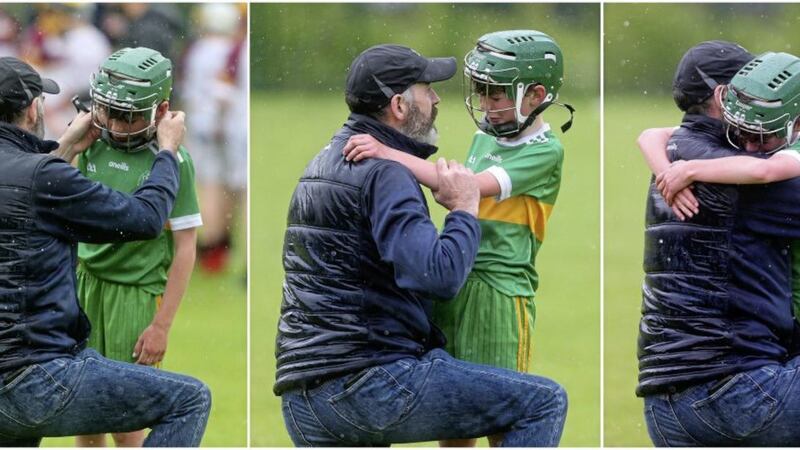These photographs were made on a rain-sodden Belfast afternoon last Thursday. They poignantly capture a few seconds. But they’re the product of relationships spanning five decades.
The photographer, Mal McCann, of this newspaper, has been my friend for 25 years.
The man pictured is my elder brother Ciarán, who works tirelessly throughout the GAA - organising and mentoring and engaging, players and teams of all ages and codes.
And then there’s the little boy, my nephew and godson Éamonn, whose 10-year-old life is an endless diet of hurling and football from breakfast to supper.
Éamonn’s tears fell last week after his team, Bunscoil Phobail Feirste, lost the Belfast schools hurling final. By all accounts they’d played out their hearts. But it wasn’t enough. His emotions are etched with the passion of his efforts.
Tears and hugs were deeply valued in our family home in Antrim, just as much as raucous laughter around the kitchen table or learning how to shoulder on a gaelic pitch.
We learned that emotions and expressions, when given with honesty and openness, are the building blocks of meaningful relationships.
I first remember daddy crying when I was 10, in summer 1983. He struggled terribly when telling us that our beloved uncle Eamon had been killed in unexplained circumstances on duty at the airport fire station at Aldergrove.
To see my nephew tearfully falling into his father’s arms last Thursday reminds me how much I would love to hug my own late father and mother, or young Éamonn’s namesake.
I dare say that if most readers were offered the chance to embrace deceased loved ones, they’d give up all the jobs, the money, the property, the false status, just to throw their arms around those people one last time.
So it says something profound when a young boy’s simplicity reveals the necessity of a hug and a helping hand, right here and right now. And the question then is: why would we imagine that this need ever leaves any of us?
When we’re older, we look at younger people sometimes only from an ageing perspective. We forget that those things sometimes appearing less important in adulthood can feel like life or death to kids, from sporting finals to broken hearts.
Then again, we tend to look at life largely from our own perspective in every other situation too. And we need to change that narrow-minded failing. Others’ stories matter.
The centrality of meaningful relationships to building a better society is often sidelined from the discourse and debate that passes for politics and public policy.
Yet there are plenty of young people who won’t feel a generous hug and a warm heart on this island tonight. They’ll be lonely and scared and hurt in ways that can only truly be healed by fundamentally changing our personal cultures – not merely changing governments or laws.
There are also plenty of adults whose full potential and happiness is trampled and trapped by this society’s culture; where deep-seated dreams and talents are often reduced to reality television and social media; where patterns of aggression and greedy ambitions have become norms.
The empowerment of dignity across society starts with individuals gifting dignity to others, especially where communications may have frosted over or broken down – whether that’s in politics or private life. Creating these relationships of human dignity is ultimately about personal actions and choices.
The power of honest emotions and engagements - shared tears and heartfelt hugs - is sometimes, in a moment of torment, the only spiritual sanctuary where each of us can safely gather the embers of hope to begin again. The great challenge we face after experiencing any hurt is to reach out and again embrace our vulnerability, courageously overcoming the fear of even further pain – personally or socially.
That goes whether we’re 10-year olds losing the only final that ever matters, or those of us who have lost fathers, mothers, siblings, children, or close friends. Or those living as survivors of tragedy in every other form: armed conflict; physical or sexual abuse; depression, heartbreak, loneliness, deprivation, discrimination. (Just look around you at Clonard Novena.)
Our entire public society is shaped by our private attitudes and actions towards one another. Meaningful, honest, valuable relationships are the cornerstones for better tomorrows.








